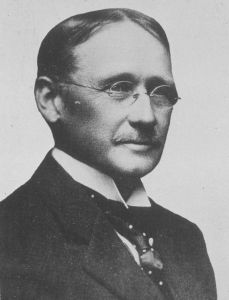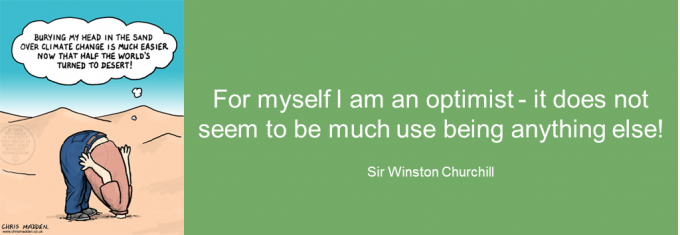
Have you heard about the “not so succesful” salesman who, if he only could get; the right brochures, the right presentation, the right manual, the right back-up and the right…
– He was certainly going to sell…!
We – the people – are experts in finding excuses “if only”, especially if our knowledge, skill, capacity or other personal qualities or performance is challenged.
10-80-10
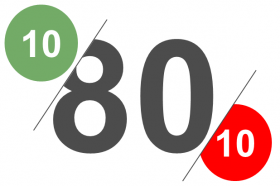
When talking about change it is good to know that 10% of us are eager for change, 10% will never change (or only superficially), the rest – 80% will “come around” and change when circumstances are right. The 80% needs more facts, more evidence, more social influence and more “guarantees” that the change will have an overall positive impact for them or at least that it’s not “harmful”. The biggest “influencer” on the 80% is the first “eager” 10% – focus on them…
“We have less than 20 years to make the change – not 20 years to plan what we are going to do…”
We are living in “urgent times”, and therefore we need “urgent response”.
Going from Industrialism….
Based on the theories in Frederick Taylor’s book “The Principles of Scientific Management” (1911) it is most effective to divide production into several operations each carried out by specialists in their single task.
Taylor theories might have been efficient in the early stages of industrialism, but they show an incredible lack of respect for people and the need for evolution and innovation.
The theories “worked” within the implicit context of a particular technological moment and thus did not account at all for a “continuous improvement process”. It treated the context as constant (which it effectively was in a short-term sense) rather than as variable (which it always is in a long-term sense).
The basic theses where embraced by many early industrialists and even governments and military organisations, and is still very apparent when you look at today’s extremely fragmented industry but also in Society at large.
A bit worrying tendency today is that Standardisation, ISO-certification schemes, EU procurement regulations, organisation set-ups etc. seems to be locked at the same target as Taylor – often failing to see that the context is constantly evolving at an increasing pace and creating long lead-times for inevitable change.
“Too much paper describing a process is not helping evolution of the process; it is only too much paper.”
….to a complex and interconnected world!
The challenges we face are not about the future of the Planet (it will survive) or our species (it will likely persist) but for the current form of interdependent, consumption orientated societies that have developed in recent centuries. If we wish to preserve the aspects of modern democratic systems that we find attractive we must act now to evolve a globally sustainable future.
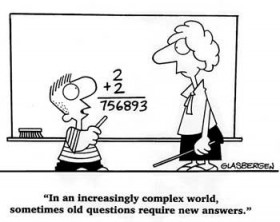
There is no way we can fully understand the complex and “fragmented” systems in our world today and results are therefore uncertain – this is a fact and something we have to accept.
The way forward must include more collaborative working with as many stakeholders as possible.
Each stakeholder needs to be involved in learning and enquiring into possible solutions and these enquiries need to be iterative. What we learn whilst trying one solution can feed back into the process to provide us with new actions and refinements.
Ongoing dialogue, transparency, accountability and a mutual willingness to accept risks is key if we are to address the challenges presented by the forces of change?
Global, continuously updated “multichannel” business intelligence will be more important than ever – we are getting very close to many of the boundaries of our planet, in fact already breaking some of them – this will affect us in ways and magnitudes that we have never experienced before.
But what about Incremental change…
Making small incremental changes towards a more sustainable process within a corporate organisation can be useful, but unless they are scrutinized also in the large perspective we need to match the huge challenges we are facing, it could actually be sub-optimizing the operation, moving focus and resources from what really needs to be done.
“…being less Bad, doesn’t mean you are Good!”
An example;
Sourcing a more environmental friendly fuel for a fleet of company cars is probably a good thing, but if you at the same time avoid to create a plan for how a fully sustainable transportation set-up should be achieved it could be draining resources from what really needs to be done.
(Purchase equipment for better online meetings and communication, re-organize to minimize travel, moving offices closer to public transportation hubs etc.)
This is what a Sustainable Strategy is all about – or as IKEA so eloquently describes it in their sustainability strategy for 2020, “People & Planet Positive”:
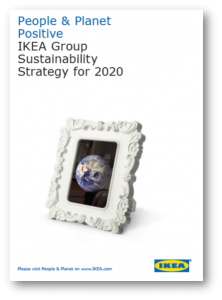 “…We can no longer use 20th century approaches to meet 21st century demands.
“…We can no longer use 20th century approaches to meet 21st century demands.
Simply working towards being less bad will not get us where we need to be – we need transformational change – which means challenging old ways and embracing the new, being bold, innovative and committed to taking action. It means taking many steps, both large and small, that, together, will have transformational impact.”
“Another world is not only possible, she is on her way. On a quiet day, I can hear her breathing.”
Arundhati Roy
